#188
On visiting Aberdeen
Despite moving up North to Scotland almost a year ago there are still lots of places to explore, so this time we went for a short trip to Aberdeen, a port city where two rivers meet the North Sea.
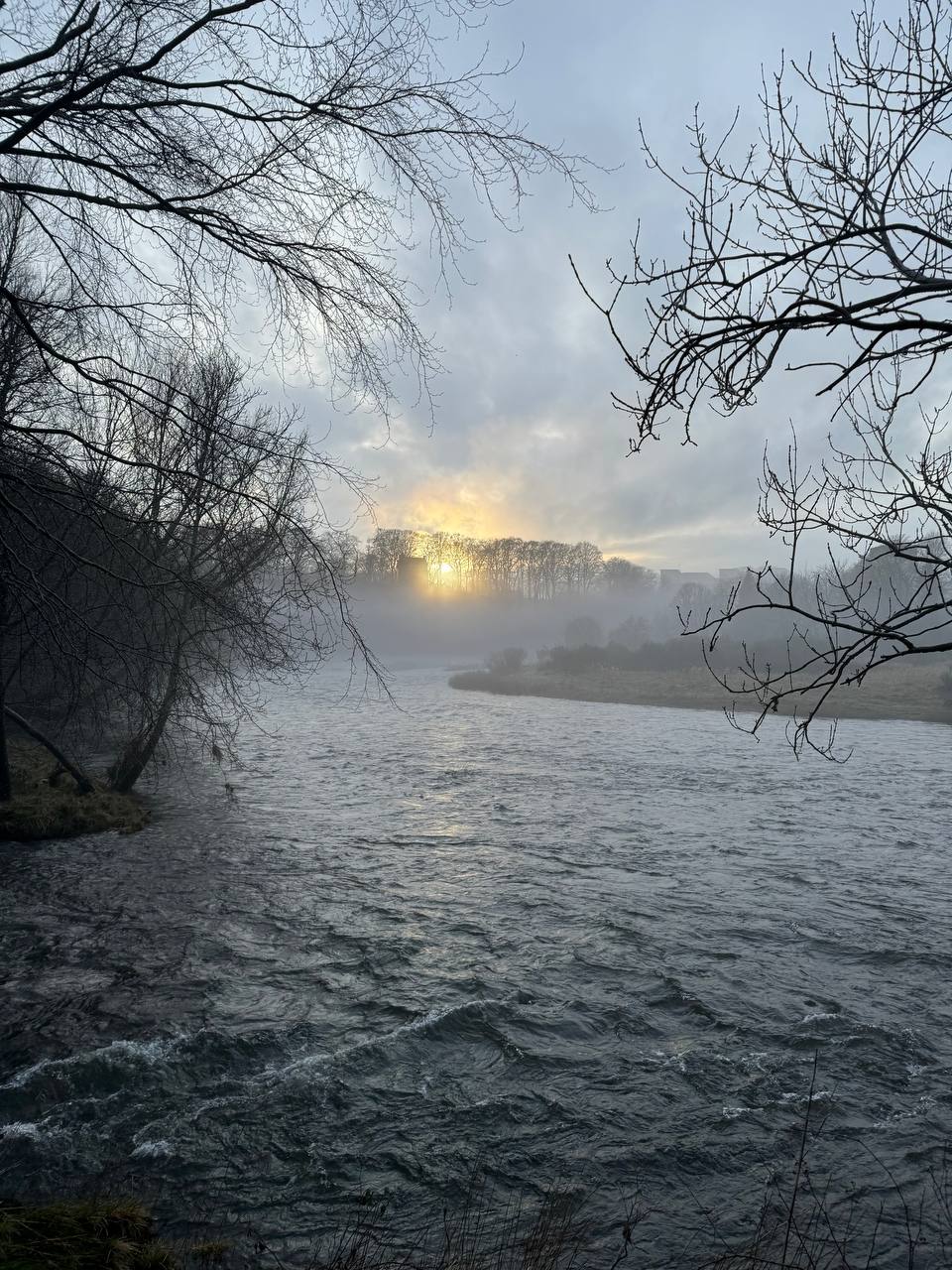
I am not a big fan of industrial places but Aberdeen is a good exception: pretty much everything it's famous for, from oil tankers to ferries, is locked up in the port, and the rest of the city is just beautiful buildings of all shades of grey.
There were two places in Aberdeen mentioned in the Michelin guide, so we've checked out both. One was a bistro with classic French cuisine, and I wasn't impressed much: the food was nice but not special.
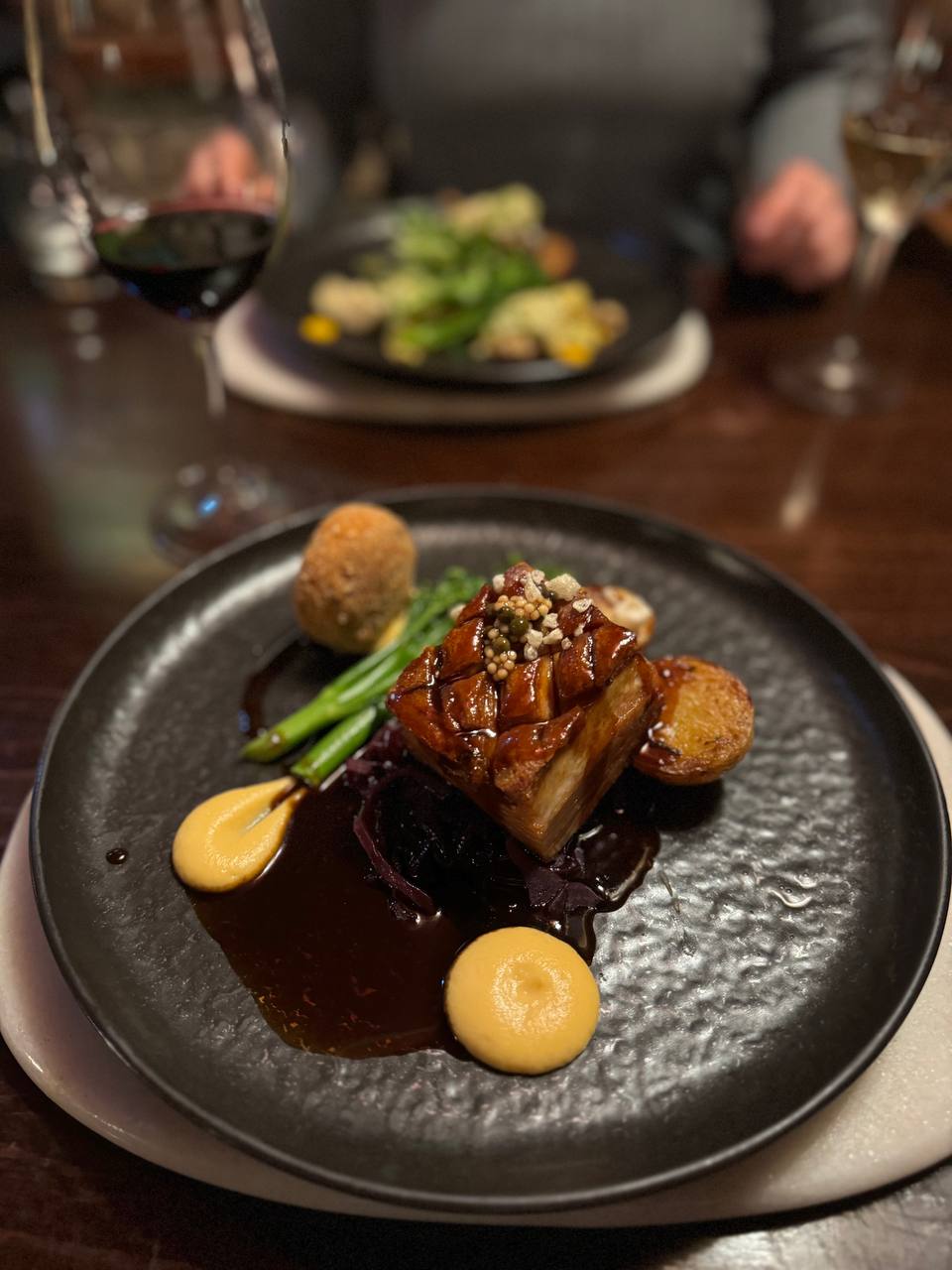
The other was a modern British place that served us two plates of one of the best pieces of fish I tried in the past decade, but what made it really special was that the chef took part in the last two years of Great British Menu, a TV show where professional chefs cook fine dining dishes under lots of time restrictions and pressure.
There was something surreal in watching him cook on TV and eating his dishes on the same day, highly recommend.
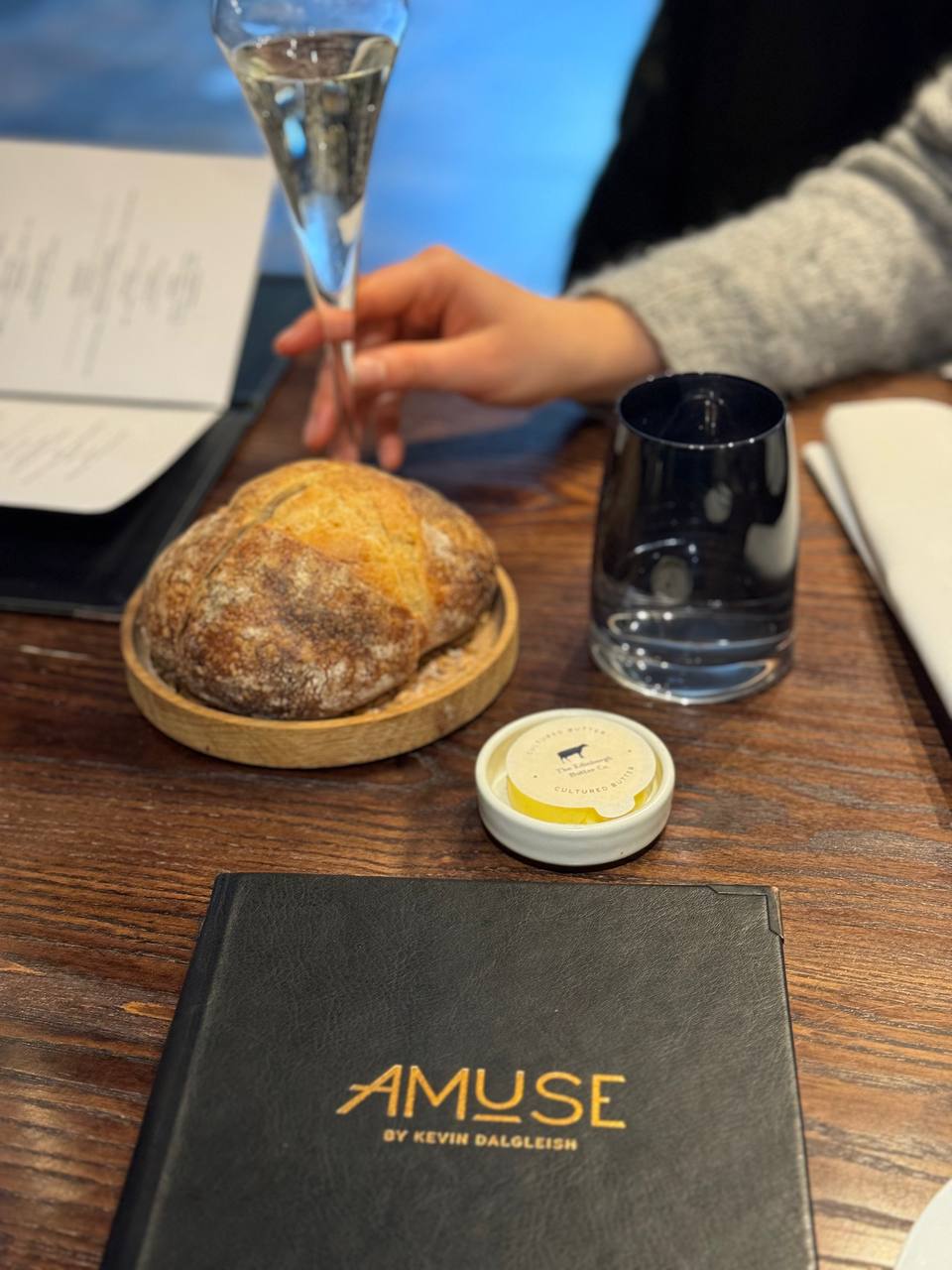
We've also went to a nearby town to explore ruins of a castle and it was definitely worth the trip:
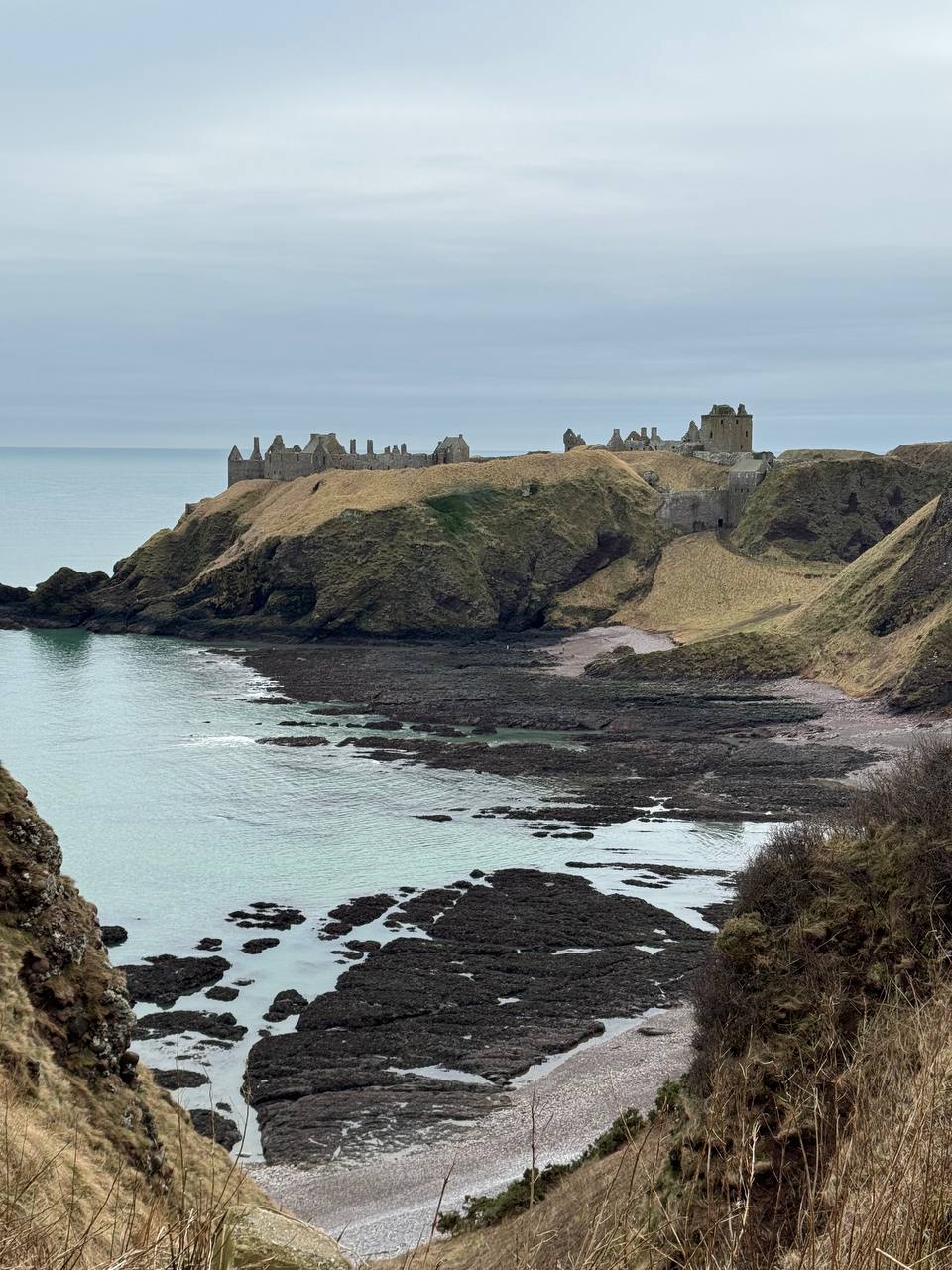
Scotland is beautiful.
Enjoying this? Get Tuesday Triage in your inbox every week.
Things I enjoyed reading
1. All My Thoughts After 40 Hours in the Vision Pro by waitbutwhy
I came across numerous reviews of Vision Pro already but if I were to pick one it'd be this one. First, because I know the author for numerous thought-provoking essays, not tech review blog posts, and second, because it's not enough to have spare thirty five hundred dollars to get a gadget for a review. To share your thoguhts on VR (or AR), you need to be passionate about it.
What I did know was that it was finally time to write a VR post. I wanted to post this week while everyone was hyped up about the Vision Pro. But I didn’t want to write about it before I had used it a lot, so I could experience not only the honeymoon phase but also what it was like to get thoroughly sick of it.
The plan was clear. I went home, told my wife that I would be deeply ignoring her and our baby for the week, and spent twelve hours a day in the headset for four straight days. I’m writing this on Thursday afternoon, having already logged over forty hours. Here are my thoughts.
I wouldn't say author's thoughts changed my mind on waiting for another generation or two of Apple's devices to get myself a headset but it made me think of getting my hands at a used Quest 2 or 3 in the meantime to get myself ready for the next decade of VR and also boost my excitement.
2. Meet Me in the Eternal City by Kaitlyn Tiffany
Given the majority of political parties, it's not a surprise every now and then rich and independent folks collectively dream about building a proper democratic society. This is one of the most recent examples:
Specifically, I had come to observe Zuzalu, a two-month co-living experiment that had been organized—and to some extent paid for—by Vitalik Buterin, a co-founder of the eco-friendly cryptocurrency ethereum. It was being hosted at a new resort and planned community on the Adriatic coast, not far from the village of Radovići. Part retreat and part conference, it was also a dry run for the more permanent relocation of tech-industry digital nomads to different parts of the world, where they could start their own societies and design them to their liking. Some 200 people had signed up for the full two months. Others, like me, popped in and out. The slate of talks for the days I was there was titled “New Cities and Network States.” European tourists smoked cigars on the promenade while Zuzalu attendees bounded around making plans for excursions and exercise and shuttles to a private Grimes show later on.
I like how the story shifts between decent stories about a better world and hipster anti-utopia (e.g the lunch the author has with an investor, but as investor is fasting they just drink water and that's it).
3. The rise and fall of the standard user interface by Liam Proven
I am pretty sure Windows 95 is the first GUI I remember dealing with, but I did my best to get used to the majority of other UIs (or lack thereof) in later years:
IBM's PS/2 range brought better graphics, but Windows 3 was what made them worth having, and its successor Windows 95 ended up giving the PC a pretty good GUI of its own. In the meantime, though, IBM's CUA standard brought DOS apps into the 1990s and caused vast improvements in usability: what IBM's guide called a "walk up and use" design, where someone who has never seen a program before can operate it first time.
The post is a nice overview of the most prominent milestones in the history of user interfaces.
4. Healthy childhood development through outdoor risky play: Navigating the balance with injury prevention by Émilie Beaulieu MD MPH FRCPC and Suzanne Beno MD FRCPC
This is a very entertaining research paper on importance of outdoor play in a risky environment. The argument boils down to the fact that the majority of injuries kids get on playgrounds are not life-threatening, and give more in terms of personal growth than safer environments:
The literature appears to support opportunities for children to recognize and test their limits and tackle new challenges. Theoretical papers have suggested that children engaging in risky play will increase their socio-emotional skills and sense of belonging. Also, the ability to communicate, cooperate, and compromise with others improves in situations where children can test and push their own limits. Risky play helps facilitate children’s exposure to fear-provoking situations, providing them with opportunities to experiment with uncertainty, associated physiological arousal, and coping strategies, which can significantly reduce children’s risk for elevated anxiety.
I guess I should be thankful for growing up in the middle of Russia, my whole childhood was risky enough to make the rest of my life a breeze.
5. The Day I Put $50,000 in a Shoe Box and Handed It to a Stranger by Charlotte Cowles
Scammers become more and more inventive every day, but I still can't believe stories like this one:
The man on the phone knew my home address, my Social Security number, the names of my family members, and that my 2-year-old son was playing in our living room. He told me my home was being watched, my laptop had been hacked, and we were in imminent danger. “I can help you, but only if you cooperate,” he said. His first orders: I could not tell anyone about our conversation, not even my spouse, or talk to the police or a lawyer.
Now I know this was all a scam — a cruel and violating one but painfully obvious in retrospect. Here’s what I can’t figure out: Why didn’t I just hang up and call 911? Why didn’t I text my husband, or my brother (a lawyer), or my best friend (also a lawyer), or my parents, or one of the many other people who would have helped me? Why did I hand over all that money — the contents of my savings account, strictly for emergencies — without a bigger fight?
I solved the problem of a potential scam somewhat successfully by blacklisting all unknown phone numbers. Some people might say I have a social anxiety, but now all these calls about taxes I owe and insurance claims I miss fall into Voicemail and eventually get lost.
6. Which Shows Got Their Finale Right, and Which Didn't? A Statistical Analysis by Daniel Parris
I rarely watch series, and even more rarely make it to the rest of the show. Most of the times I drop off after the first season. This is however a good way to figure out which shows are worth watching: it'd be very sad to make it through six or seven years worth of episodes just to get disappointed by the finale.
Amid the intense competition of the streaming wars, show quality and viewer satisfaction are as important as ever. To end a show well is to generate positive word of mouth, which yields more subscriptions. How many potential viewers have been deterred from subscribing to HBO for Game of Thrones after hearing about the show's disappointing finale? Probably a non-trivial amount.
So, have shows gotten better at ending in recent years, or has the win-at-all-costs content explosion of the streaming wars eroded quality?
Over the last sixty years, finale quality has drastically improved, with the percentage of disappointing final episodes significantly decreasing and the share of satisfying and transcendent conclusions increasing.
The author looked at ratings of episodes and compared them to the finale ratings and the number of viewers, and then split many popular shows into categories of those where the last episode excideed viewers' expectations or not.
7. How to keep engineers out of meeting hell by Brian
I have a few meetings every day, and most of them are completely useless. They lack both agenda and outcomes, could've been emails, or just rudimentary leftovers from the needs we had as a company years ago. What's sad is that it's a very common sight in many companies:
A meeting outcome is not the same as an agenda. An agenda is an outline for how the meeting will be conducted, not what it will achieve. A great many pointless meetings have had wonderful well-structured agendas.
Meetings need a reason for existence, and that’s why they need a desired outcome. Make sure the outcome is clear, achievable, and relevant.
That being said, the most useless type of meetings are the midday social lunch ones, where everyone is chewing with their webcam on.
8. How AI is changing gymnastics judging by Jessica Taylor Price
While the rest of the world is busy generating images from text, at least someone is using AI for bigger things:
For more than a decade, the sport’s judges had used video review to address scoring inquiries. But there was still a need for a system that could catch errors the human eye could not. Human judges can sometimes miss the tiny measurements that can make or break a score—if a split is one or two degrees short of the minimum required, or if a dismount is off axis by just three or four degrees. In the wake of sanctions disciplining judges for scoring irregularities around the same time Watanabe became president, he pledged to “add Japanese technology so I can improve the fairness and justice of gymnastics.”
It became official in 2017, when the FIG formally announced its collaboration with Fujitsu. Developing the system took thousands of hours of research and work.
I am not sure what surprised me most here, the fact that the system was demoed almost a decade ago, or the fact that it's a purely technical sport, hence the marks could be produced without any human interaction.
9. Recipes die every day. Very occasionally, they come back to life by Lilah Raptopoulos
To some extent, recipes are as unique as people who follow them, and when people die some recipes die with them:
She got the pickles in one try. The chickpea meatballs took more. Each time she returned the woman would say “Bigger!” Or “Spicier!” It was the diligent work of a historian: knowing that Diyarbakir didn’t have flour a century ago, Ozyerli tried semolina to bind them. It worked. Finally, on the fifth try, she nailed it.
“I ran to her house with the pickles and chickpea meatballs. She tasted them both and started to cry.”
I like the perspective here, as the author highlights the fact that sometimes the recipe is definitely different from the original, but the flavour is the same, and at that point it doesn't really matter if the recipe is the same or not. What matters is the memories.
10. Men are going to brutal boot camps to reclaim their masculinity. How did we get here? by Charles Trepany
This is a great business model and I wish I wasn't too lazy to host something similar:
Billed online as a "75-hour crucible," the experience involves grueling physical challenges under the instruction of military veterans. Those who make it through get access to a year-long coaching and mentorship program called the Modern Day Knight Mastermind Program. It costs $18,000 to attempt.
The Project's goals, per its website, are to get men to shatter their self-doubt, see their purpose clearly, heal their trauma and uncover what's holding them back. USA TODAY's interview request for Bedros Keuilian, the founder of the project, went unanswered.
I also like that the price is for an "attempt", not the actual coaching. I couldn't find their Trustpilot rating though.
Did you know I make apps?

Layered
I never know what to wear. Now AI suggests outfits from my actual wardrobe based on weather and what I haven't worn in a while.
Take a look →Things I didn't know last Tuesday
1. Noughties
I heard this in a phrase and had lots of hilarious ideas of what it could mean, none of which were correct:
the period of years between 00 and 10 in any century, usually 2000–2010:
They were born in the noughties and grew up completely at ease with computer technology.
The caveat is in the spelling, and instead of being related to naughty it comes from nought, another word for zero or nothing.
2. Letters of last resort
This is a grim tradition but it does make sense:
The letters of last resort are four identically worded handwritten letters from the prime minister of the United Kingdom to the commanding officers of the four British ballistic missile submarines. They contain orders on what action to take if an enemy nuclear strike has both destroyed the British government and has also killed or otherwise incapacitated both the prime minister and their designated "second person" of responsibility, typically a high-ranking member of the Cabinet such as the deputy prime minister or the first secretary of state.
What's interesting is that unopened letters are destroyed when the new prime minister is appointed and new letters are written.
3. Aberdeen waste incinerator
I had no idea burning waste could generate heat and (usable) electricity.
Located in East Tullos, the plant is a joint venture between Aberdeen City, Aberdeenshire and Moray councils and will take rubbish from across the north-east which will then be burned and turned into electricity and heat.

We were passing by it on a train and had no idea what that alien-looking building is and it wasn't on maps, but seems like we weren't alone so it was very easy to Google.
4. “Teddy Hat” cocktail
This is a pretty cool way to turn a drink into a political statement.
As historian Mark Will-Weber notes in Mint Juleps with Teddy Roosevelt, “[It] was the garnish that made this drink famous!” Bartenders cut a lemon peel into a shape like the distinctive Rough Rider hat Roosevelt had worn during the Spanish–American War of 1898 and tossed it into the glass—the “ring”—with a flourish. How drinkers responded to the lemon revealed their politics. If they tossed it out, they supported Taft. If they kept the lemon in, they supported Roosevelt.
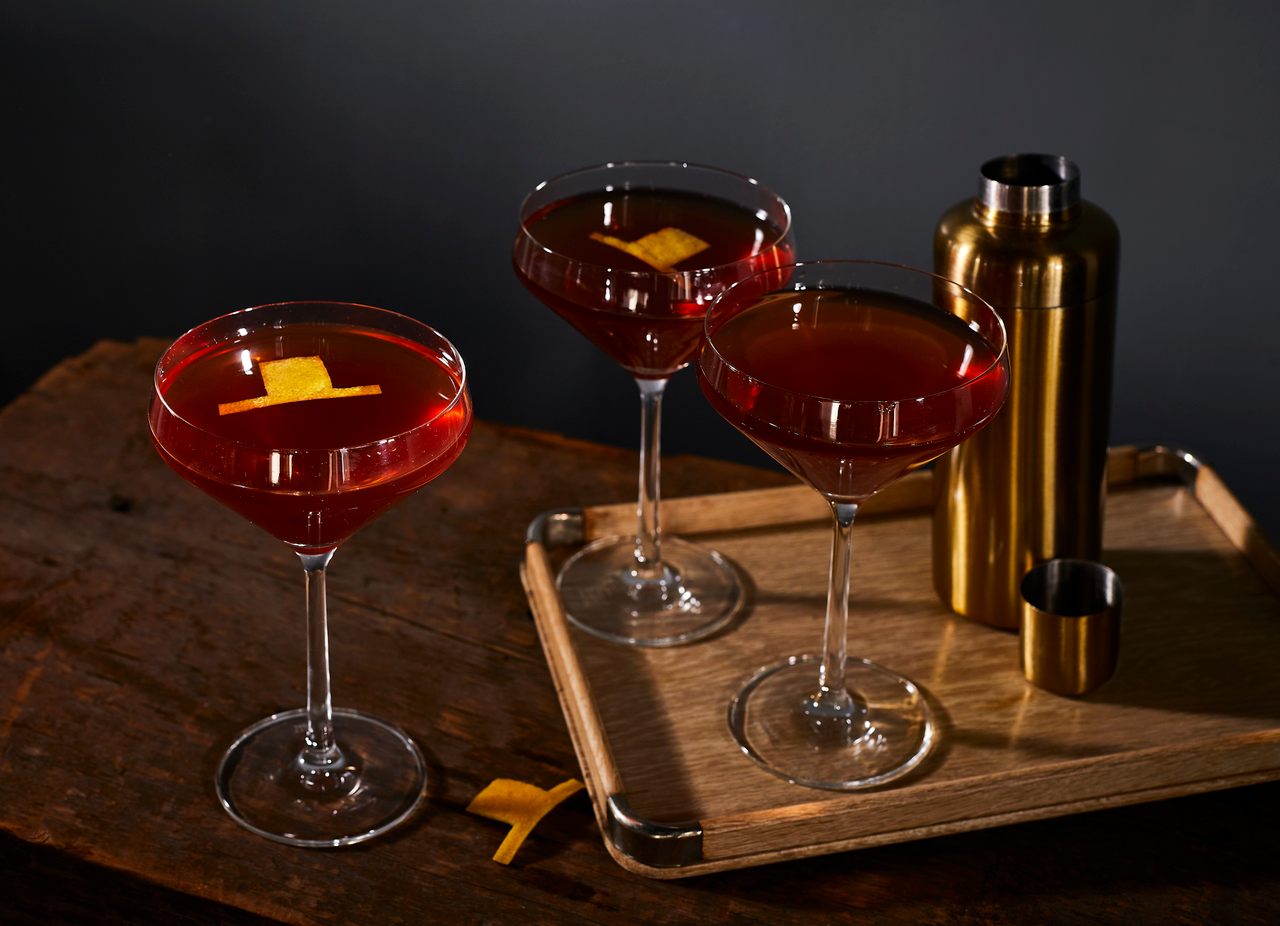
The name and garnish come from Teddy Roosevelt's phrase “My hat is in the ring" during elections.
5. Food desert
I didn't know shops could sell only fast food and frozen items until walking into an Iceland recently (at that point I also understood where its name is coming from):
A key element of a food desert is its lack of healthy and nutritious foods. As food deserts are typically defined by household's decreased access to supermarkets and healthy food acquisition sources, areas defined as food deserts tend to have a greater number of fast food restaurants and convenient stores that are often more accessible and affordable for households.
The term seems to mostly apply to the States though, where it affects areas for miles and miles around.
6. Costmary
The article features a few unusual herbs to plan this year but this one piqued my interest in particular:
Many herb guides note that costmary was also known as “Bible leaf,” since its strong smell (reminiscent of balsam) was once used by Americans to mark pages in Bibles and protect the books from pests. The young leaves can be eaten in salad, or added to drinks for a lemony, herbal taste.

I wonder if it actually worked against pests though.
7. Kinako
This is an interesting way to take a dish to the next level:
Kinako is roasted soybean flour, a product commonly used in Japanese cuisine.

Looking at the recipes online, most often it's used by sprinkling on top of other dishes, akin to breadcrumbs or cheese or nuts.
8. ¥500 coin differences
A note to self: never rely on ¥500 coins in Japan:
A quick search online shows that nonacceptance of the new ¥500 coins — the silver and gold colored ones issued since late 2021 — definitely occurs elsewhere. A Kyoto Shimbun article from last year reports the same problem with vending machines and parking meters in the prefecture, for example.
I don't think the author explains why though, but seems like it's a mix of the new coin's weight (7.1 g vs 7.0 of the old ones) and a different type of ridges. Either way, most coin machines are not happy.
9. Sacchettoni
That's a beautiful way to shape your pasta:
Sacchettoni [sakketˈtoːni] is a type of stuffed pasta also known as "beggar's purse". It consists of small circles or squares of pasta filled like ravioli then fastened at the top like a small bag.
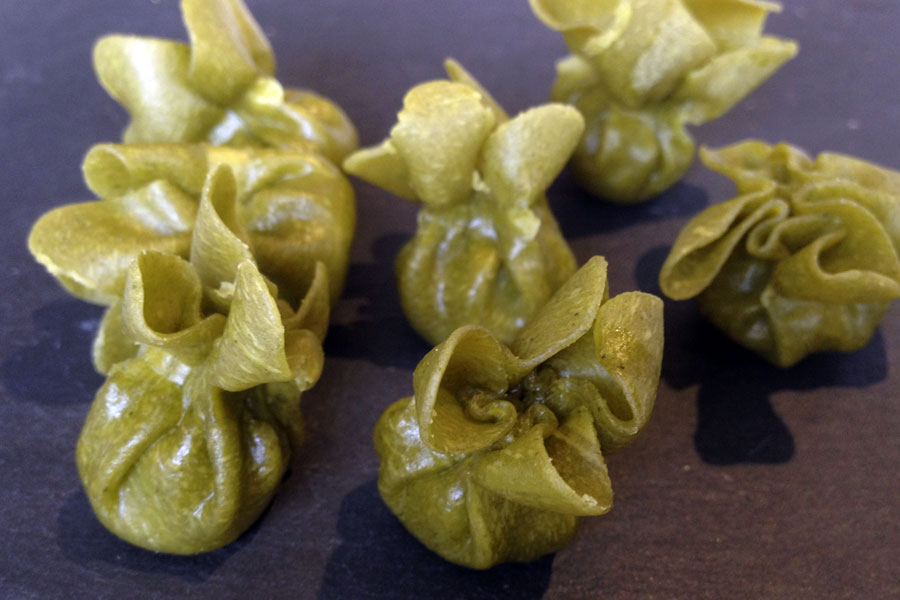
The ones pictured above are the traditional ones but these days there are even more beautiful examples using black- or blue-coloured dough.
10. Jelly Ears' etymology
I first encountered these mushrooms last year and for a long time thought they're inedible, but they're just tasteless. What's interesting though is their Latin name etymology:
Auricularia auricula-judae
Named after the apostle, Judas, who allegedly hanged himself from an elder tree.

Seems a bit far-fetched.
Book of the week
I thoroughly enjoy long train journeys, especially when they don't have many stops along the way and the internet connection is too fragile to mindlessly scroll through Instagram.
This week I made my way though half a dozen of Max Frei's books: not my first time and definitely not the last.
It's very hard to describe Max Frei's prose but the closest would probably an odd mixture of Terry Pratchett and Carlos Castaneda, where the latter contributes parts of the plot, and the former heavily influences the style.
Max Frei's The Stranger's Shadow is the fourth book in the series, and probably the most recent translated into English. Surprisingly, it's very hard to translate comparing to other books originally written in Russian that I shared before:
“No need to explain. While you are here with me, I know everything you know, including all the fairy tales that fascinate you. You speak of the goddess who sometimes helped people, but only those she liked. You have a beautiful legend about an Origin by the name of Ulysses, who for a very long time could not return home. Keep in mind that the reason he couldn’t return was because he did not wish to—the curses of the gods had nothing to do with it. His story is nothing like yours, but it’s still one and the same story. All Origins are wanderers among people because they do not wish to come home. Perhaps we all still remember that home is a terrifying place.”
“You don’t mean the home where I was born, do you?” I said quietly.
“Of course not. The home where you were born, and the home where you count on waking up tonight, and the home where you, presumably, will return on an evening a thousand years hence—these are all just pieces of land, surrounded by walls and covered over to protect them from the sky. Places where you can lie down in your bed and close your eyes briefly at dawn. Nothing more. Do you understand my meaning? Now go. They are waiting for you.”
Re-reading the quote above, it also reminds me a lot of early Haruki Murakami's novels, and to an extent – Richard Bach's books, like Jonathan Livingston Seagull.
Thank you and see you in a week
(or in a month)!
If you'd like to support the newsletter, please subscribe to the weekly plan. Otherwise you will keep receiving the letters on a monthly cadence – no need to do anything to opt-in.
If you have any questions, or want to suggest a link for the next newsletter, please drop me a message on Twitter or reply to this email.
Cheers! 🍸
Need help with iOS?
I spent a decade on FDA-regulated medical devices and apps with millions of users. Now I help teams ship MVPs, rescue messy architectures, and build the hard bits that don't fit in a sprint.
Learn more →